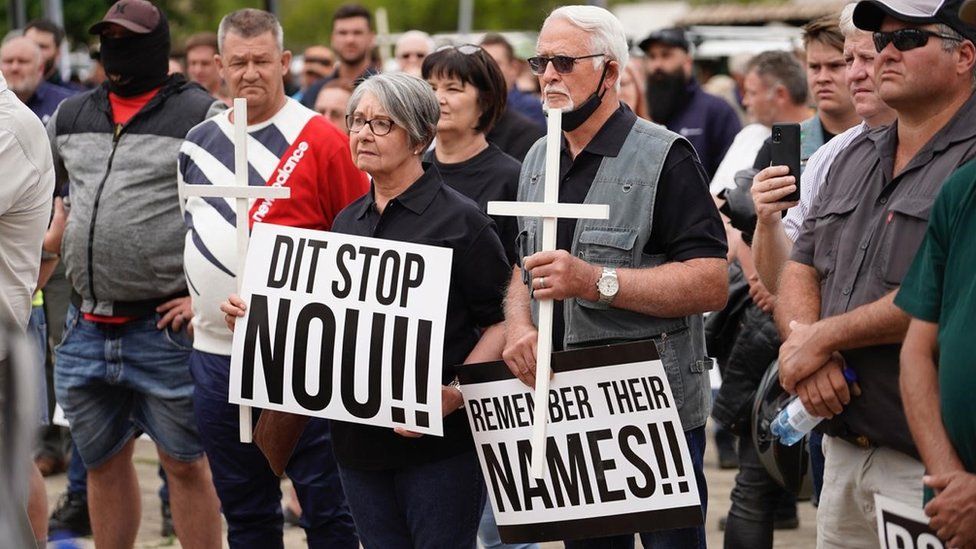South Africa white farmers condemned for storming Senekal courthouse
- Published

South Africa's government has condemned an "anarchic" protest by white farmers who stormed a court building and burnt a police vehicle on Tuesday.
Police reportedly fired stun grenades to disperse protesters, who were demanding that two men detained over a farmer's murder be handed over to them.
Some protesters held placards reading "Boer Lives Matter". Boer is an Afrikaans word which refers to farmers.
The killing of white farmers is a highly emotive issue in South Africa.
Some conservative groups say the farmers are victims of a genocide and the government is not doing enough to protect them.
The government dismisses the allegation, saying the farmers are victims of crime in remote areas and efforts are being made to step up security.
Afrikaans-speaking farm owners were a bedrock of support for the system of apartheid, which legalised discrimination against black people.
Decades of white-minority rule ended in 1994, with Nelson Mandela becoming South Africa's first black president.
What was apartheid? A 90-second look back at decades of injustice
What happened at court?
The latest flashpoint of tension was the rural town of Senekal in Free State province following the brutal murder of 21-year-old Brendin Horner.
His body was found on Friday tied to a pole on the farm he managed.
He had been killed by suspected stock thieves, local media reported.
Two men - Sekwetje Mahlamba and Sekola Matlaletsa - appeared in Senekal Magistrate's Court on Tuesday over his murder. They have not yet been asked to plead.
Several hundred farmers, some of them in tractors, arrived at the court to protest against Mr Horner's killing.
The demonstration descended into chaos, with police saying protesters fired two shots but no-one was injured. A spokesman for the protesters denied the allegation.
"They damaged the court property while forcing their way to the court cells. A police van parked outside the building was also overturned and burned," police spokesman Motansi Makhele said.
Allow Twitter content?
This article contains content provided by Twitter. We ask for your permission before anything is loaded, as they may be using cookies and other technologies. You may want to read Twitter’s cookie policy, external and privacy policy, external before accepting. To view this content choose ‘accept and continue’.
In a statement on Wednesday, Justice Minister Ronald Lamola described the violence as "anarchic", and an "inexcusable assault on the rule of law".
"The disturbing scenes of members of the public damaging property have no place in a free and democratic South Africa," he added.
'Lack of faith in justice system'
The clash between the police and farmers outside the Senekal Magistrate's Court is about more than vandalism or a public spectacle. It reflects a lack of faith in the justice system.
The farmers demanded that the murder suspects be handed over to them, presumably to administer their own justice. It is an uncomfortable development. If left unchecked, some say, it could lead to vigilantism.
For years white farmers have said that they are under siege, being killed on their properties - seemingly without much state intervention. The government's response has been that crime finds its way into everyone's home. And that they are doing what they can to fight it.
Statistics suggest that the majority of victims of crime are black, but that is because black people are the majority, and are disproportionately exposed to some of the factors that fuel crime - inequality, poverty and unemployment.
South Africa is a tale of two countries and it does not take much for problems to become racialised. It is a sign of the tensions that are always simmering just beneath the surface.
- Published18 December 2018
- Published1 September 2018